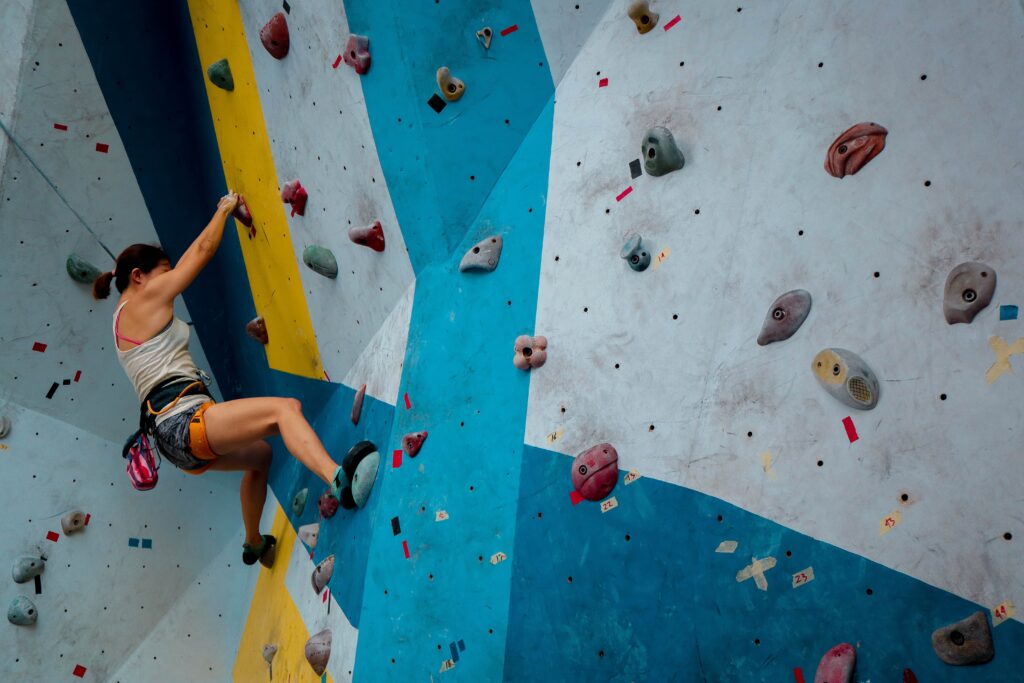How does one diversify hobbies yet again while still staying in the wheelhouse of outdoor activities they know and love? Cue, rock climbing. From beautiful sights for the eyes to fresh air for the lungs, rock climbing offers a sweet mixture of all things to love about being outside. To start at the very beginning (because it’s a very good place to start,) here are some benefits of rock climbing and where to begin.

Benefits of Rock Climbing for Beginners
Physical Fitness
First and foremost, rock climbing counts as cardio without even having to put on running shoes. Cool, right? Your strength will skyrocket because you’re engaging all your body's different parts. The uppers to the lowers will be singing by the end of the day. Another huge aspect of climbing is balance, breathing, and overall body awareness. You have to settle into your body and how the movements you make impact your success all while building strength.
Plus, by gripping the rock you’ll even fine-tune some small motor skills. Climbing is a perfect mixology of strength, technique, and determination. Who can say no to gains like these!?
Mental Fitness
There are oh so many benefits of climbing that stretch beyond just the obvious physical ones. Climbing seriously pushes your limits in the best of ways. It challenges you mentally and physically at the same time which means double the exhaustion level for the same amount of work. As with many things that push limits, when you get to the top of that peak (literally,) the sense of accomplishment will keep you coming back. Your confidence will soar knowing that you can do hard things. Much like an adult puzzle that you are the piece to every time, climbing is all about problem-solving. With each climb, you learn and grow which seems hokey but is also so satisfying.
Camaraderie
While all of the above is wonderful for any adventurer, the best part of climbing is the community. Everyone is amazingly encouraging and constantly cheers you on; everyone pitches in; everyone puts in the work. Most of all, everyone always seems to want you to succeed genuinely.
Rock Climbing for Beginners Tips
Here is the black box warning for you though; if you’re not an experienced climber, you gotta get a guide. Why? Because safety first folks. Having a good grip (pun intended) on climbing from a professional is the way to do it. Plus, you’ll get to meet new people and have someone to talk to between climbs. Win-win.
If you’re in the NC area, I highly recommend Fox Mountain Guides and Climbing School. I recently took the littles and had the best of times (shameless plug for Austin Stroker, he’s amazing and was super with the kids). If you’re thinking you’re not this or that enough to climb, think again.
A few frequently asked questions from beginner rock climbers:
How do I start rock climbing?
To start rock climbing, you can begin by finding a local climbing gym or outdoor climbing area. Take a beginner's course or hire a certified climbing instructor who can teach you the basics of climbing techniques, safety protocols, and equipment usage. It's essential to start with easy routes and gradually increase the difficulty as you gain experience and strength.
Is rock climbing a hard sport?
Rock climbing can be physically and mentally challenging, but the difficulty level depends on the type of climbing you choose. Indoor climbing and top-rope climbing on well-established routes tend to be more accessible to beginners. As you progress, you can explore lead climbing, bouldering, or outdoor climbing on more challenging terrains. Remember to start at your own pace and gradually build your skills and endurance.
Do I need to lose weight to rock climb?
Rock climbing is a sport that welcomes individuals of all shapes and sizes. It emphasizes the strength-to-weight ratio, which means being lighter can offer certain advantages in terms of ease and efficiency while climbing. However, it is not necessary to lose weight to enjoy rock climbing. Climbing focuses on developing overall strength, technique, and problem-solving skills, which can be achieved regardless of body size or weight.
What is the correct way of rock climbing?
There is no one-size-fits-all approach to rock climbing as techniques can vary depending on the type of climbing, route, and individual preferences. However, some general principles apply, such as maintaining three points of contact, using your legs for stability and power, keeping your weight close to the wall, and using proper handholds and footholds. It's crucial to learn and practice proper climbing techniques to ensure safety and efficiency while scaling the rocks. Taking lessons or climbing with experienced climbers can help you refine your skills.
What type of climbing is best for beginners?
For beginners, top-rope climbing is often the recommended starting point. In this type of climbing, a rope is already set up at the top of the route, and you climb while being securely attached to the rope. It allows beginners to focus on learning climbing techniques and building strength without the added complexities of lead climbing or bouldering. Top-rope climbing provides a safe and controlled environment for beginners to develop their skills and confidence on the wall.
